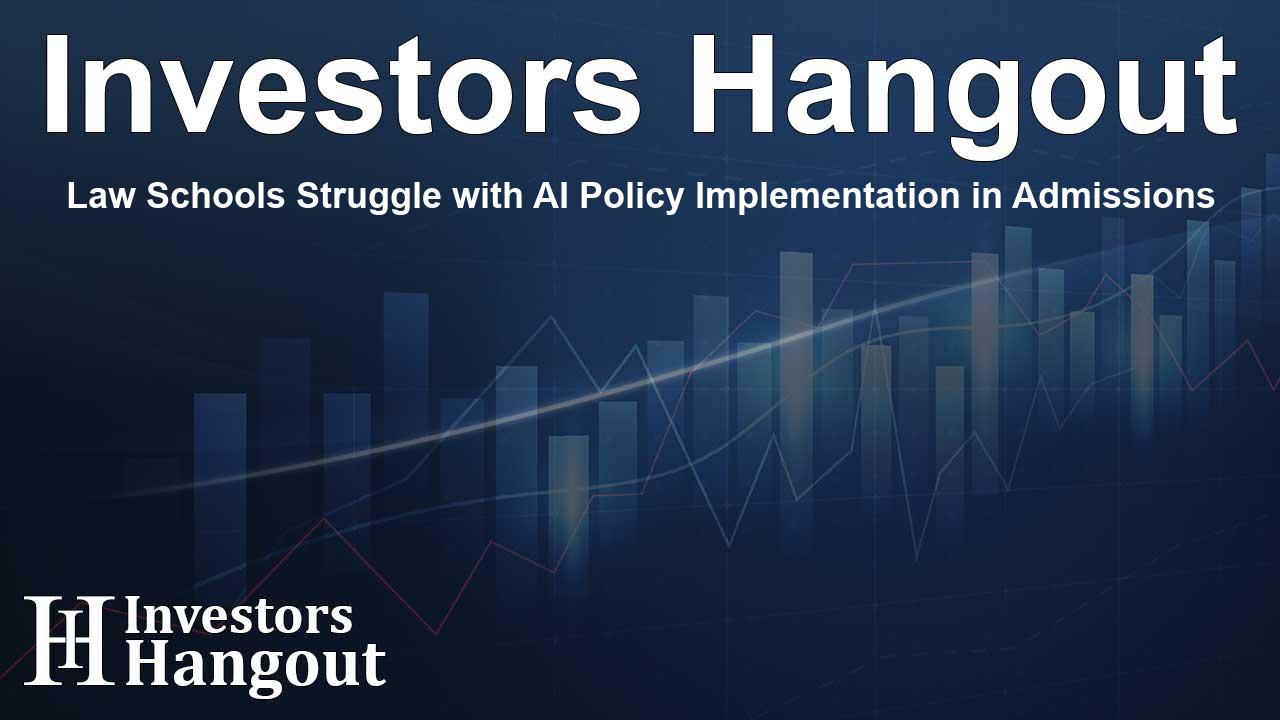Law Schools Struggle with AI Policy Implementation in Admissions

Survey Insights on AI Use in Law School Admissions
A recent survey conducted by Kaplan reveals significant gaps in official policies regarding the use of artificial intelligence (AI) by law school applicants. As AI technology gains traction, the impact of its use in admissions essays has become a pressing concern. According to the survey data, law schools vary widely in their stance towards AI, leading potential applicants to navigate confusing waters. This situation is especially worrisome since the admissions essay is often deemed critical in assessing candidates.
A Little-Accepted Use of Generative AI
Among the law schools surveyed, only a minute proportion—1 percent—has formal policies permitting applicants to use generative AI programs like ChatGPT for drafting their essays. In stark contrast, a substantial 45 percent prohibit its usage outright, leaving 54 percent without any official stance on the matter. This indicates that a large segment of schools has yet to formulate clear guidelines to help applicants understand the acceptable use of AI technologies.
Brainstorming and Feedback Policies
The survey results also shed light on how law schools view the use of generative AI for brainstorming and feedback. Sixteen percent of admissions officers state that their institutions permit applicants to utilize AI for brainstorming essay ideas, while another 16 percent impose a ban. Most—68 percent—have no policy in this area. Similarly, just 15 percent allow applicants to receive AI-generated feedback on essays they draft independently, with an equal percentage opposing this practice. A dominant 70 percent of schools lack official regulations regarding feedback processes.
Perspectives from Admissions Officers
Admissions officers who participated in the survey expressed varied opinions on the use of AI in the admissions process. One officer asserted, "Using generative AI diminishes the applicant’s unique voice and hampers essential writing skills, which have already seen a decline." Another emphasized the significance of authenticity in personal statements, arguing that reliance on AI tools for brainstorming diminishes that authenticity. Furthermore, an officer noted the importance of transparency, suggesting that applicants should disclose their AI usage, explaining how the technology aided their application process rather than replacing genuine effort.
Kaplan’s Insights on Need for Official Policies
Amit Schlesinger, Kaplan's executive director for legal and government programs, spoke about the unexpected absence of official policies at many institutions. He remarked, "More law schools should establish clear pathways for AI utilization to maintain fairness in the admissions process. The lack of formal guidelines may mislead applicants into thinking AI use is permissible, creating confusion surrounding ethical practices." He stressed that providing transparent rules would not only offer clarity but also uphold the integrity of the admissions process, allowing students to present their genuine talents.
The Changing Landscape of Law School Admissions
The landscape of law school admissions is evolving, especially with advancements in technology. While AI presents various opportunities, it also poses significant risks to authentic expression within application essays. As law schools grapple with these challenges, developing cohesive policies becomes critical in guiding prospective students on how to navigate the complexities of the application process.
About Kaplan
Kaplan, Inc. is renowned for its global educational services that empower individuals and institutions to achieve their educational and professional goals. With a commitment to inclusivity, Kaplan offers resources that cater to a diverse range of students, professionals, and educational institutions. Founded in 1938 by Stanley Kaplan, the company now operates in over 27 countries, supporting approximately 1.2 million students and thousands of corporate clients and educational institutions worldwide. Kaplan continues to evolve its offerings in tune with the demands of today’s dynamic world, maintaining its legacy of expanding educational opportunities for all.
Frequently Asked Questions
1. Why are official AI policies important for law schools?
Official policies provide clarity to applicants on the acceptable use of AI, ensuring fair practices in admissions and helping maintain the integrity of applications.
2. What is the current stance of law schools on using generative AI in admissions essays?
The majority of law schools either prohibit or have no official policies regarding the use of generative AI in admissions essays.
3. How does AI use impact applicants' authenticity?
Excessive reliance on AI tools can diminish the unique voice of applicants, leading to concerns about the authenticity of their submissions.
4. What insights did admissions officers share regarding AI use?
Many admissions officers highlighted concerns about the decline of writing skills and stressed the importance of applicants presenting their genuine abilities and voices.
5. What role does Kaplan play in the educational landscape?
Kaplan provides a variety of educational services to students, professionals, and institutions, supporting their journey toward achieving educational and career aspirations.
About Investors Hangout
Investors Hangout is a leading online stock forum for financial discussion and learning, offering a wide range of free tools and resources. It draws in traders of all levels, who exchange market knowledge, investigate trading tactics, and keep an eye on industry developments in real time. Featuring financial articles, stock message boards, quotes, charts, company profiles, and live news updates. Through cooperative learning and a wealth of informational resources, it helps users from novices creating their first portfolios to experts honing their techniques. Join Investors Hangout today: https://investorshangout.com/
Disclaimer: The content of this article is solely for general informational purposes only; it does not represent legal, financial, or investment advice. Investors Hangout does not offer financial advice; the author is not a licensed financial advisor. Consult a qualified advisor before making any financial or investment decisions based on this article. The author's interpretation of publicly available data shapes the opinions presented here; as a result, they should not be taken as advice to purchase, sell, or hold any securities mentioned or any other investments. The author does not guarantee the accuracy, completeness, or timeliness of any material, providing it "as is." Information and market conditions may change; past performance is not indicative of future outcomes. If any of the material offered here is inaccurate, please contact us for corrections.